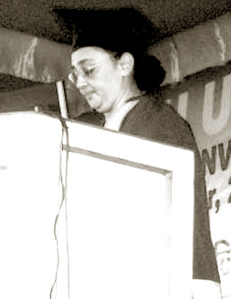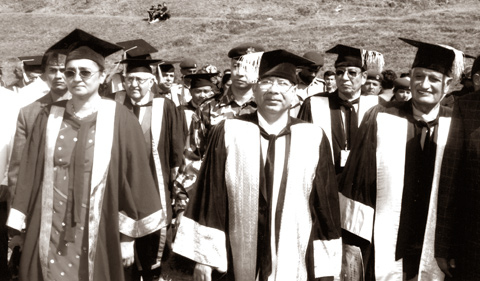|
Universities have leading role to play:
The drive towards knowledge economy
by Prof. Kshanika HIRIMBUREGAMA
|

Prof. Kshanika Hirimburegama, Vice-Chancellor, University of
Colombo delivering the Convocation Address.
|
 Human resource development by facilitating the transfer of
“knowledge” for practical use is the basis of higher education. The
knowledge gained through education gives strength to a person and the
society, to face the globalised challenges of the modern world with
confidence. Correctly guided higher education in any discipline will
promote deep analytical thinking, positive attitudes and gathering of
information for problem solving and finally produces a person who can
make a positive change in the society. Therefore, the education one
achieves is for the person’s benefit, society’s benefit, and finally for
the benefit of the country. Human resource development by facilitating the transfer of
“knowledge” for practical use is the basis of higher education. The
knowledge gained through education gives strength to a person and the
society, to face the globalised challenges of the modern world with
confidence. Correctly guided higher education in any discipline will
promote deep analytical thinking, positive attitudes and gathering of
information for problem solving and finally produces a person who can
make a positive change in the society. Therefore, the education one
achieves is for the person’s benefit, society’s benefit, and finally for
the benefit of the country.
You could be very happy that you have climbed the first step in the
ladder. Your hard-earned degree is the foundation for the beginning of
skills and competency development, and the beginning of your learning
career. You have laid a foundation - a strong foundation from a
well-reputed university.
There are many more who would have loved to be with you in the
university and be present with you here today, but have not got the
opportunity. It is your responsibility that your colleagues who could
not pursue higher studies are also given benefits through your
education. Make sure, you serve them as well. When employed, do
effective, efficient, honest and genuine work. The mind would then be
free for innovations and creations as it is devoid of ill-thinking.
Education should also bring qualities such as patience, tolerance,
mind control, sympathy and compassion to others. Do not go behind
monetary benefits. Your mind will never be at ease.
Life is millions of chemical reactions to a chemist and biological
molecules to a biologist. A failure in a few reactions would result in
illnesses such as diabetes and hypertension. Mind controls many of these
reactions through regulating the tension, etc. Therefore, mind
regulation is required to be developed through education.
Learning is lifelong. We learn until death. Innovations, new
technology and information gathering give us satisfaction. This is an
intellectual character. A country needs to produce educated
intellectuals for its national development. Competition is necessary for
development, to improve the quality of life. Competition should be
considered as a challenge in a positive manner rather than a headache
that could bring stress to life.Nothing is stressful, if you take it as
another meal. We take delicious meals and not so delicious ones,
depending on the accessibility.Competition is also the same. Therefore,
take it as a challenge.
My memories go back to my university, the University of Colombo, also
my alma mater. It is the oldest university in Sri Lanka. It grew from
the University of Ceylon that was established in 1942 under the colonial
rulers. The oldest component, Ceylon Medical College, the second oldest
medical school in South Asia, had been founded in 1870. The forerunner,
the Ceylon University College, had been founded in 1921. The University
of Colombo currently has seven Faculties (Medicine, Science, Law,
Management and Finance, Arts, Education and Graduate Studies) managing
43 academic departments. The university also has one Campus for Mass
Media and Performing Arts and an internationally reputed School of
Computing (UCSC).
The University of Colombo has seven financially independent
Institutes that specialise in different disciplines; Indigenous
Medicine, Human Resource Development, Postgraduate Medicine, Molecular
Biology, Library Sciences, and the latest in Agro-biotechnology.
Altogether, the University of Colombo has 10,000 undergraduates and
about 25,000 other students in extension courses and postgraduate
courses. It is important to highlight that the undergraduate education
is totally public funded, while other courses are self-financed, but
highly subsidised.
The university is in the process of developing a virtual campus to
offer on-line courses where delivery will be multimode. All avenues will
open up more opportunities for both Sri Lankans as well as the
international community of all ages to pursue higher education and
knowledge.
Knowledge economy
An economy of a country becomes a “Knowledge Economy” when the
sustained use and creation of knowledge are at the centre of its
national development process. The country could then use knowledge as
the key engine for its economic growth where knowledge is acquired,
created, disseminated, and used effectively to enhance national
development, where “Human Resource Advancement” is a key factor.
Knowledge and innovation through competition have played a crucial
role in development with the beginnings of human civilisation. With
globalisation and the technological revolution of the last few decades,
knowledge has clearly become the key driver of economic development and
is now profoundly reshaping the patterns of the world’s economic growth.
Especially, developing countries should therefore think, with some
urgency, about their future under a knowledge economy heading. If not,
developing countries would not be able to face the challenges of
globalised competitiveness.
The central role of knowledge and innovation in economic growth is
widely acknowledged in developed countries, which are coping with new
realities. The nations with well-managed economies have benefited
quickly from the new opportunities, thereby moving towards a high growth
rate and productivity performances. In Europe, small and dynamic
economies such as Finland and Ireland have become models of
Knowledge-based growth or “Knowledge Economy”.
The knowledge utilisation gap between developed and developing
countries is growing even wider. It is very important to realise that
developing countries must move rapidly to join the fast-moving global
economies and the knowledge base that supports it.
It is noted that this knowledge economy is far away for many
developing countries where formulation of appropriate policies for
knowledge-based development has not been done.
The less conducive political and economic management environments are
the main reasons. Developing countries need to move fast or will remain
slow-moving poor economies against fast-moving rich economies that
exploit new knowledge effectively through global market strategies.
Rapid advances in knowledge and the model of knowledge economy with
the strong commitment and political will provide new potential for
economic growth in countries like Sri Lanka and Nepal. The successful
transition to a knowledge economy depends on the key contribution from
organisations such as innovative companies and firms, universities,
research centres, and other organisations involved in the knowledge
revolution, that tap the growing stock of global knowledge, assimilate
and adapt new knowledge to local needs.
A main pillar of the knowledge economy framework is an educated and
skilled work force that is continuously being upgraded. This knowledge
compatible work force is known as “knowledge workers”.
Knowledge organisations
The role of universities as knowledge organisations, as knowledge
creation centres, is extremely important in guiding the nation towards a
knowledge economy. Universities continuously need to produce skilled
knowledge workers through human resource advancement to sustain the
knowledge economy.
The second important pillar is access to modern and adequate
information infrastructure. Latest information is essential to acquire
the modern knowledge. The third pillar is economic incentives and
institutional regime that provide a good economic policy, which lead to
creativity and use of existing knowledge. This leadership through
political will is the most important and significant requirement.
I would like to discuss a modern approach as a good example from my
own experience, for the role of a university as an initiator and a
leader for this transition to the knowledge economy while advancing
human resource and a compatible management system.
We were involved in a biotechnology transfer to agriculture of the
rural sector in Sri Lanka. Sri Lankan farmers of all age groups took up
the tissue culture biotechnology for banana plants and modern banana
cultivation practices.
The entire banana production process saw an eight to ten fold
increase in farmer income, while having less risk and less work with
easy marketing, compared to conventional crop cultivations. The demand
for tissue cultured high quality banana plants rapidly increased.
The rural farming community showed keenness to take up novel
technology and new knowledge, apply it, as the end result is increased
income with less risk. Having observed this thrust for new knowledge,
the university through its newly established Institute for
Agrotechnology and Rural Sciences, located 250 km away from Colombo’s
main university, introduced on-line Agro-biotechnology Certificate
Courses to the farming community. Initially 60 such agriculturists in
the age range 22 - 60 were selected to follow the courses. Many had not
even touched a computer. But they all followed the on-line program very
well and have already passed three courses.
Hidden capabilities
This is possible because of their hidden capability, enthusiasm, and
hunger for knowledge and liking for higher education. The knowledge
gained is immediately applied to their cultivation practices while
becoming “knowledge farmers”.
It is also important to highlight that a sophisticated tissue culture
laboratory was established at the same place with local resources, and
it is entirely run by the rural community where the human resource thus
developed were compatible with modern management practices essential for
the modern technology.
This is the potential in developing countries that has to be
harnessed through education, and universities have to play a key role.
People like to learn more to gain knowledge to generate more income.
This proves that our countries have a very high potential for the
knowledge economy through higher education.As you are well aware, Sri
Lanka suffered nearly 30 years of war due to the world’s most ruthless
terrorists who basically ruined the peaceful living of all Sri Lankans.
Thanks to the leadership of President Mahinda Rajapaksa, the people
of the nation now live in peace and harmony and have the hope of
accelerated national and regional development after three decades of
instability.
I address this august gathering, breathing with relief that my
country is reunited after 30 years and all Sri Lankans could live
happily with their families.
We Asians may not be rich by Western financial standards, but we do
have a rich intellectual capacity and a culture and nature.
With the intellectual capacity with naturally selected genetics, and
using our natural resources we could develop our countries and
strengthen the economy of Asia.
We have our rich cultures and values, ancient technologies, natural
flora and fauna. These combined with new knowledge gained through higher
education could leave our countries to flourish in peace and harmony
(The above is the address made by Prof.Kshanika Hirimburegama,Vice-Chancellor,
University of Colombo at the Convocation of the University of Kathmandu,
Nepal recently.)
|

